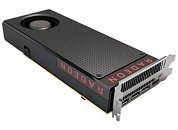- Joined
- Oct 9, 2007
- Messages
- 47,649 (7.44/day)
- Location
- Dublin, Ireland
| System Name | RBMK-1000 |
|---|---|
| Processor | AMD Ryzen 7 5700G |
| Motherboard | Gigabyte B550 AORUS Elite V2 |
| Cooling | DeepCool Gammax L240 V2 |
| Memory | 2x 16GB DDR4-3200 |
| Video Card(s) | Galax RTX 4070 Ti EX |
| Storage | Samsung 990 1TB |
| Display(s) | BenQ 1440p 60 Hz 27-inch |
| Case | Corsair Carbide 100R |
| Audio Device(s) | ASUS SupremeFX S1220A |
| Power Supply | Cooler Master MWE Gold 650W |
| Mouse | ASUS ROG Strix Impact |
| Keyboard | Gamdias Hermes E2 |
| Software | Windows 11 Pro |
AMD's design of the Radeon RX 480 graphics card, which draws over 75W of power from the PCI-Express x16 slot, has cost it a product listing on the PCI-SIG Integrators List. The list is compiled for hardware devices implementing the various PCI-Express specifications to the letter. The RX 480 is off-spec, in that it overdraws power from the slot, as the card needs more power than what the slot and the 6-pin PCIe power connector can provide while staying within specs. According to these specs, the slot can provide up to 75W of power, and the 6-pin connector another 75W. The RX 480 was tested to draw more than this 150W power budget.
What this means for AMD is that it cannot display the PCI-Express certification logo on the product or its marketing materials. This, however, may not affect AMD's add-in board (AIB) partners that are PCI-SIG members in their own right, and make graphics cards with their own sub-vendor IDs, provided their power-supply designs comply with PCIe specs. Custom-design cards with an 8-pin PCIe power connector, instead of 6-pin, may qualify as the combination of the 8-pin connector and the slot yields a power budget of 225W. AMD released a software fix to the issue of the cards overdrawing power from the slot, with the Radeon Software Crimson Edition 16.7.1 Beta.

View at TechPowerUp Main Site
What this means for AMD is that it cannot display the PCI-Express certification logo on the product or its marketing materials. This, however, may not affect AMD's add-in board (AIB) partners that are PCI-SIG members in their own right, and make graphics cards with their own sub-vendor IDs, provided their power-supply designs comply with PCIe specs. Custom-design cards with an 8-pin PCIe power connector, instead of 6-pin, may qualify as the combination of the 8-pin connector and the slot yields a power budget of 225W. AMD released a software fix to the issue of the cards overdrawing power from the slot, with the Radeon Software Crimson Edition 16.7.1 Beta.

View at TechPowerUp Main Site






